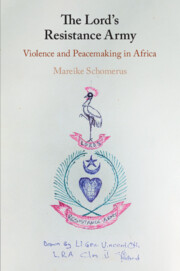Book contents
- The Lord’s Resistance Army
- The Lord’s Resistance Army
- Copyright page
- Contents
- Figures
- Acknowledgements
- Note on the Text
- Abbreviations and Acronyms
- 1 Introduction
- 2 The Lord’s Resistance Army
- 3 The Juba Peace Talks with the Lord’s Resistance Army in 2006
- 4 ‘Am I an Animal?’
- 5 The Juba Peace Talks with the Lord’s Resistance Army in 2007
- 6 ‘Reach Out a Hand and Pull It Back’
- 7 The Juba Peace Talks with the Lord’s Resistance Army in 2008
- 8 ‘LRA Has Already Become a System’
- 9 ‘We Are All Learning in This Peace Process’
- References
- Index
5 - The Juba Peace Talks with the Lord’s Resistance Army in 2007
‘We Don’t Know If We Can Trust’
Published online by Cambridge University Press: 09 April 2021
- The Lord’s Resistance Army
- The Lord’s Resistance Army
- Copyright page
- Contents
- Figures
- Acknowledgements
- Note on the Text
- Abbreviations and Acronyms
- 1 Introduction
- 2 The Lord’s Resistance Army
- 3 The Juba Peace Talks with the Lord’s Resistance Army in 2006
- 4 ‘Am I an Animal?’
- 5 The Juba Peace Talks with the Lord’s Resistance Army in 2007
- 6 ‘Reach Out a Hand and Pull It Back’
- 7 The Juba Peace Talks with the Lord’s Resistance Army in 2008
- 8 ‘LRA Has Already Become a System’
- 9 ‘We Are All Learning in This Peace Process’
- References
- Index
Summary
This chapter focuses on the 2007 events in the Juba Peace Talks between the Lord’s Resistance Army/Movement (LRA/M) and the Government of Uganda. Entering the year with a frayed relationship between the LRA/M and the mediator due to the lack of activity to deal decisively with Ugandan army attacks on the LRA as it was trying to assemble as part of negotiations, 2007 brought to the fore the challenging internal dynamics of the LRA/M. These included internal distrust and sabotage but also increased engagement with an ever-growing collection of outside actors which pulled the LRA/M in different directions. One way of maintaining coherence was to exert control at the very heart of the LRA, which led to the killing by Joseph Kony of his deputy, Vincent Otti. The year 2007 also showed increased international engagement, including from the USA, which further confused possibilities for the peace talks: The international community signalled simultaneously its willingness to find a solution to the arrest warrants by the International Criminal Court as well as its support for a military strike against the LRA. In the broader dynamics of the talks, these contradictions further strengthened the impasse.
Keywords
- Type
- Chapter
- Information
- The Lord's Resistance ArmyViolence and Peacemaking in Africa, pp. 136 - 156Publisher: Cambridge University PressPrint publication year: 2021

